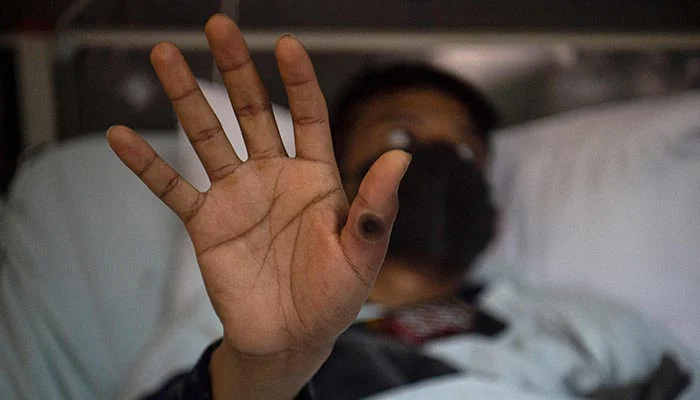Pakistan issues alert after surge in monkeypox cases globally
NCOC directs Border Health Services to screen all travellers for Mpox and Zika virus at all entry points
August 14, 2024

- Pakistan reported nine cases of monkeypox last year.
- NCOC also issue alert for vector-borne Zika, dengue, chikungunya.
- India reports 81 cases of Zika virus, including four deaths in Pune.
ISLAMABAD: In response to the rising cases of Mpox globally, particularly in African countries, and the recent outbreak of the Zika virus in Pune, India, the National Command and Operations Center (NCOC) has issued an alert to the Border Health Services, urging strict vigilance at all points of entry, National Institute of Health (NIH) officials said on Wednesday.
In an emergency meeting on Wednesday, the NCOC urged the Border Health Services to maintain strict vigilance at all points of entry.
It also alerted all provincial health departments to remain vigilant and monitor potential outbreaks of vector-borne diseases like Zika, dengue, and chikungunya.
These viruses, carried by mosquitoes present in Pakistan, pose a significant threat, especially during the ongoing monsoon season when accumulated rainwater creates ideal breeding conditions.
“An increase in Mpox cases has been observed in several countries, including those in Africa, while a rise in Zika virus cases has been reported in Pune, India. The NCOC is closely monitoring the situation and has advised the Border Health Services (BHS) to screen international travelers for Mpox and Zika virus at all airports and points of entry,” an NIH official told The News.
In the past year, Pakistan has confirmed nine cases of Mpox, all among travellers returning from the Middle East and other countries. Tragically, one patient, who was co-infected with HIV and Mpox, later died in Islamabad.
During a special session of the NCOC on Mpox, it was noted that around 15 African countries are currently reporting Mpox cases, with a total of 2,030 confirmed cases. Four countries — Burundi, Kenya, Rwanda, and Uganda — previously unaffected by Mpox, have reported cases since mid-July 2024.
According to NIH officials, the World Health Organisation (WHO) reported that from January 1, 2022, through June 30, 2024, a cumulative total of 99,176 laboratory-confirmed cases of Mpox, including 208 deaths, were reported from 162 countries across all six WHO regions.
In June 2024 alone, 934 new cases were reported, with most cases coming from the African Region (61%), followed by the region of the Americas (19%) and the European region (11%).
The WHO has noted a decline in reporting, which means recent trends in Mpox cases should be interpreted with caution. WHO continues to encourage all countries to ensure that Mpox is a notifiable disease and to report cases, including when no cases have been detected (known as ‘zero-reporting’).
Regarding the Zika virus, although no official cases have been detected in Pakistan, researchers at Aga Khan University claim to have identified four cases in Karachi between 2021 and 2022, indicating that Zika virus is circulating in the city, according to NIH officials.
In neighboring India, 81 cases, including four deaths, have been reported in Pune as of August 8, 2024. Among these, 32 cases were reported in pregnant women.
“We also have the vector — the mosquito that carries the Zika, dengue, and chikungunya viruses. Given the current monsoon rains, conditions are highly conducive to the spread of the Zika virus in the country. In light of this, we have alerted all relevant authorities, provincial health departments, border health services, and others to remain vigilant against outbreaks of vector-borne diseases,” an NIH Islamabad official added.









